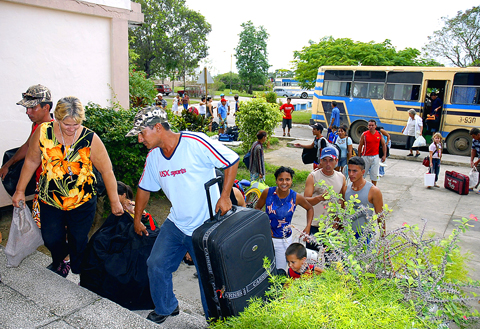Hurricane Paloma, packing winds of up to 195kph, slammed the central Cuban province of Camaguey overnight on Saturday, the third powerful hurricane this season to lash the Caribbean island.
The Cuban weather service said the storm weakened slightly from the 230kph winds that had threatened. Cuban officials said they expected Paloma to leave Cuba yesterday morning headed for the Bahamas.
The National Hurricane Center in Miami, Florida, said the storm had dropped from Category 4 — with winds of 230kph — to Category 3 on the Saffir-Simpson scale.

PHOTO: AP
Paloma has already buffeted the Cayman Islands on its way to Cuba, but spared the islands heavy damage, local officials said.
The storm became a hurricane in the Caribbean Sea late on Thursday.
The storm hit after dark so the extent of damage wasn’t immediately clear.
But in parts of the Cayman Islands, hit by the late-season storm a day earlier, roofs were sheared off and an airstrip was left under 0.6m of water.
“There is one word to explain it: catastrophe,” the Miami Herald quoted John Bogle, a Red Cross volunteer in the Caymans, as saying. “I estimate there is 98 percent damage to all the roofs that I can see.”
Cuban state-run TV reported widespread blackouts and said a communications tower had fallen in the province of Camaguey, where Paloma made landfall on Saturday evening near the town of Santa Cruz del Sur.
Rains of up 25cm were predicted, with more possible in mountainous areas, the hurricane center said.
A storm surge up to 6m had caused coastal flooding, pushing the sea as much as 700m inland and flooding hundreds of homes. TV reports showed waves whipped up over coastal barriers, a beached boat listing on its side and, on shore, trees bending in the wind.
“The weather is really bad. It’s raining heavily and the wind is blowing strong,” said Mirtha, who was on watch in the Communist Party headquarters in Santa Cruz del Sur.
“I almost cannot open the windows but I can see some small palm trees that have fallen over,” she said, declining to give her full name.
More than 1 million people were evacuated as Paloma approached. So far, no deaths or injuries had been reported.
Cuba was struck by two powerful hurricanes, Gustav and Ike, within just seven days of each other between August and September. The island was devastated, with an estimated US$9 billion in damage.
Paloma is the third hurricane and the fifth major tropical storm to hit Cuba this season.
It is the 16th storm in the current season — set to end on Nov. 30 — in the Atlantic Ocean.

Yemen’s separatist leader has vowed to keep working for an independent state in the country’s south, in his first social media post since he disappeared earlier this month after his group briefly seized swathes of territory. Aidarous al-Zubaidi’s United Arab Emirates (UAE)-backed Southern Transitional Council (STC) forces last month captured two Yemeni provinces in an offensive that was rolled back by Saudi strikes and Riyadh’s allied forces on the ground. Al-Zubaidi then disappeared after he failed to board a flight to Riyadh for talks earlier this month, with Saudi Arabia accusing him of fleeing to Abu Dhabi, while supporters insisted he was

‘SHOCK TACTIC’: The dismissal of Yang mirrors past cases such as Jang Song-thaek, Kim’s uncle, who was executed after being accused of plotting to overthrow his nephew North Korean leader Kim Jong-un has fired his vice premier, compared him to a goat and railed against “incompetent” officials, state media reported yesterday, in a rare and very public broadside against apparatchiks at the opening of a critical factory. Vice Premier Yang Sung-ho was sacked “on the spot,” the state-run Korean Central News Agency said, in a speech in which Kim attacked “irresponsible, rude and incompetent leading officials.” “Please, comrade vice premier, resign by yourself when you can do it on your own before it is too late,” Kim reportedly said. “He is ineligible for an important duty. Put simply, it was

The Chinese Embassy in Manila yesterday said it has filed a diplomatic protest against a Philippine Coast Guard spokesman over a social media post that included cartoonish images of Chinese President Xi Jinping (習近平). Philippine Coast Guard spokesman Jay Tarriela and an embassy official had been trading barbs since last week over issues concerning the disputed South China Sea. The crucial waterway, which Beijing claims historic rights to despite an international ruling that its assertion has no legal basis, has been the site of repeated clashes between Chinese and Philippine vessels. Tarriela’s Facebook post on Wednesday included a photo of him giving a

Syrian President Ahmed al-Sharaa on Sunday announced a deal with the chief of Kurdish-led forces that includes a ceasefire, after government troops advanced across Kurdish-held areas of the country’s north and east. Syrian Kurdish leader Mazloum Abdi said he had agreed to the deal to avoid a broader war. He made the decision after deadly clashes in the Syrian city of Raqa on Sunday between Kurdish-led forces and local fighters loyal to Damascus, and fighting this month between the Kurds and government forces. The agreement would also see the Kurdish administration and forces integrate into the state after months of stalled negotiations on